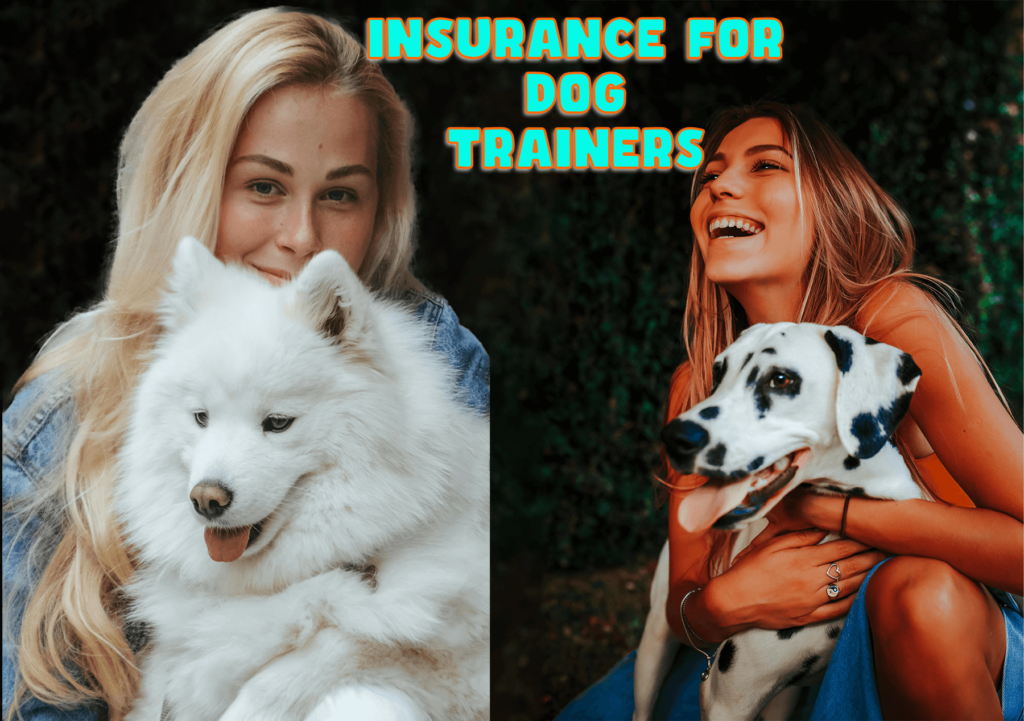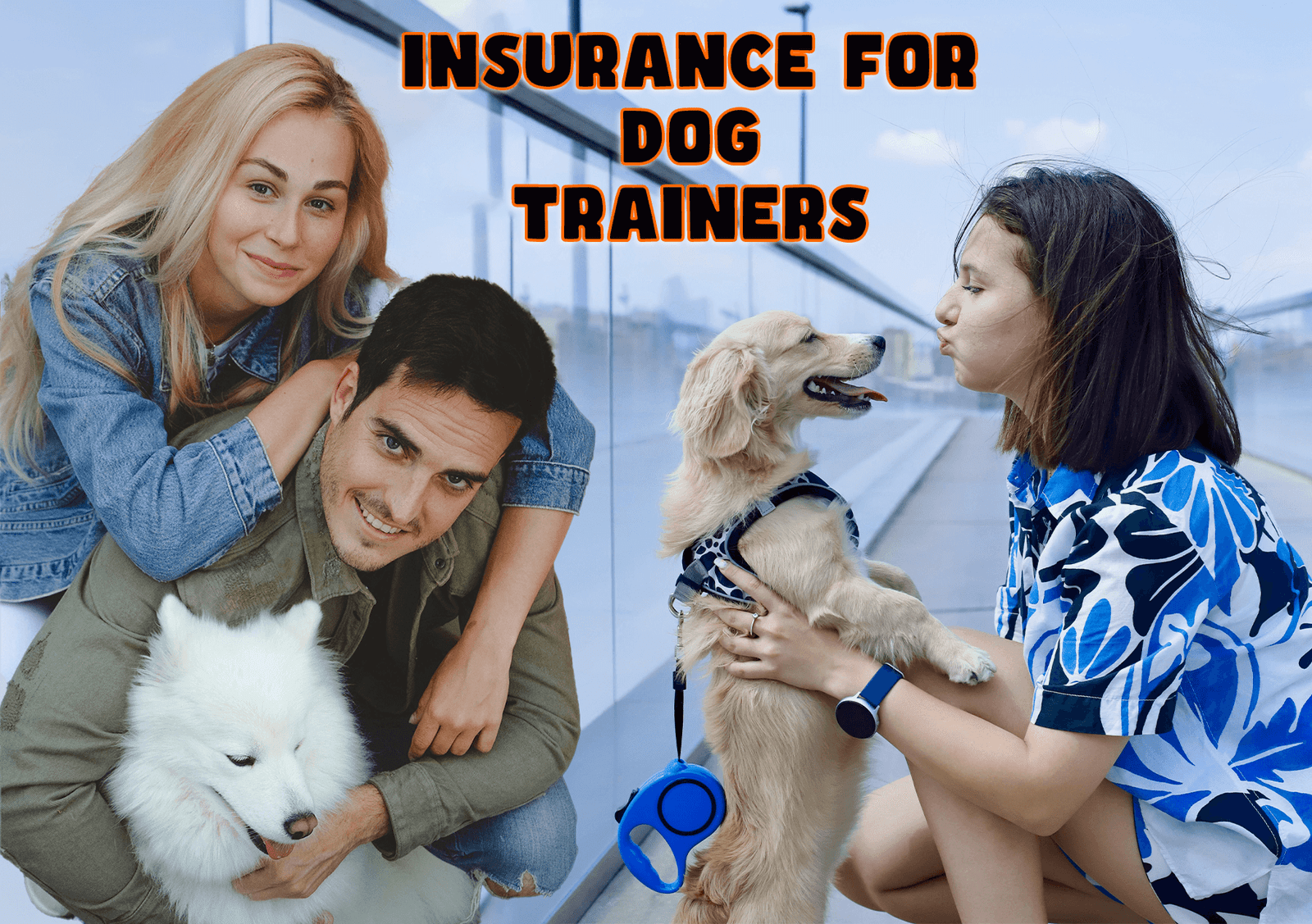Training dogs is an increasingly lucrative field that can bring immense fulfilment for both dog and owner, yet it can pose risks that could injure either dog trainer, animal, or owner! Learn more about Insurance for Dog Trainers.
Therefore, trainers’ insurance reduces this risk and protects companies against major financial loss. This article thoroughly reviews different insurance options available to dog trainers, discussing each policy type while outlining assessments to select an ideal policy and settle claims efficiently.
Introduction to Insurance Coverage for Dog Trainers
Why Dog Trainers Need Insurance Coverage: Three Reasons
Insurance provides financial security to safeguard dog trainers against their profession’s dangers and liabilities. When running a training centre or operating at home or in public areas, dog training insurance protects both business and personal assets against lawsuits stemming from damages to property, injuries sustained on the job, and legal liability issues that might result.

Dog Trainers Should Consider the Potential Risks Encountered when Caring for Pets
Dog bites and injuries: Handling animals with behavioural problems increases the chance of bites or injuries that could cause significant traumas to humans and dogs alike.
Damage to Property: Dogs under your supervision could potentially cause significant property damage, whether that belongs to clients or training centres.
Client Injuries: Students participating in exercises may sustain injuries that require medical attention during exercise sessions, which could result in legal action being pursued against them.
Legal Liability for Professionals: Legal issues arise if inadequate training or diligence can result in legal matters for professionals.
Equipment theft or damage: Can equipment used for training be stolen? Yes.
Different Types of Insurance Coverage about Insurance for Dog Trainers
General Liability Insurance covers most everyday circumstances that could leave someone exposed.
Coverage Scope: Injuries caused to third parties such as clients, employees or innocent bystanders are covered.
Property damage by trainers or their dogs under their supervision could include repairs.
Settlement and legal costs related to claims.
Importance:
When teaching dogs in any training setting, dog trainers require basic protection from common accidents or injuries. Providing basic security against unforeseeable incidents or injuries during instruction is vital to their work! This policy offers such security.
Professional Liability Insurance (Errors and Omissions)
Coverage Scope: Reliability is defined as being able to provide services with professional qualifications in an efficient and timely fashion.
Legal expenses related to competent mistakes have increased substantially.
Importance: Protect clients claiming lack of education or guidance caused injury or property damages; also necessary to ward off malpractice lawsuits.
Commercial Property insurance covers commercial real estate investments.
This coverage scope covers damage caused to training facilities by vandalism, fire, theft, or natural disaster.
Equipment and training devices.
Importance:
Protecting physical assets for your dog training company in case an accident occurs can help ensure operations continue post-event.
Workers’ Compensation Insurance offers much-needed peace of mind.
Coverage Scope: Wages and medical costs for injured workers in the event of work-related injuries can be covered under this policy.
Rehabilitation expenses associated with workplace injuries.
Importance: Employers in certain states with employees must obtain worker’s compensation coverage as part of their state regulations to protect themselves and their employees against potential workplace incidents. This protects both parties involved—employers and workers alike!
Business Interruption Insurance Coverage is available.
Coverage Scope:
A covered incident (such as an accident, fire, or natural catastrophe ) interrupting business operations directly results in revenue loss.
Importance:
Emergency funds assist businesses in maintaining financial stability during unexpected stoppages or shutdowns. Emergency funds help cover both regular expenses and lost revenues that arise as a result.
Animal Bailee Insurance
Coverage Scope:
This policy offers coverage to help cover medical treatment for dogs injured or killed under their trainer’s instruction.
Pet insurance protects you in case your beloved animal escapes or goes missing.
Importance: Pet owners who take responsibility for caring for animals, such as dogs, can purchase special insurance plans that offer financial protection in case accidents happen that may harm the animals in their custody.
Equipment Insurance
Coverage Scope: With regard to training equipment as well as tools.
Importance: Protecting your most essential equipment ensures business continuity if something breaks or fails; no losses would incur from failing or destroyed equipment.
Understand Legal Requirements
State and Local Regulations in effect in various locations
Insurance requirements for dog trainers could differ based on local and state regulations, making knowledge of them essential to compliance and selecting policies accordingly. Certain areas might necessitate minimum coverages, such as liability indemnity.
Professional Requirements and Licenses for Real Estate Management in Oregon and Washington
Certain states may mandate dog trainers hold specific certifications or licenses before providing services. At the same time, associations like the Association of Professional Dog Trainers (APDT) could require compliance with specific insurance requirements for dog trainers.
Selecting an Appropriate Insurance Plan
Assess Your Risk Exposure ( Insurance for Dog Trainers )
Assess the specific risks posed by your dog-training business. Consider factors like the breeds of dogs you teach in training environments, company size, employee health, and safety measures in place.
Comparing Insurance Providers
Compare different insurance providers and see how their policies stack up against one another.
Cost of premiums and deductibles.
Coverage may contain exclusions or limits that reduce coverage options available to you.
Customer Satisfaction Ratings.
Try to communicate with other trainers or organizations within your field for advice regarding various insurance providers.
Reading and Understanding Policy Terms
Carefully read all conditions and terms of potential insurance policies before purchasing them. Learn what coverages are provided and any policy restrictions, claim procedures or additional services, such as an attorney, for further help and clarification. Suppose any uncertainties exist in any coverage provided or limitations placed upon policies. Whenever in doubt, seek advice from qualified professionals such as an insurance consultant.
Steps for Acquiring Dog Trainer Insurance
Research and Prep ( Insurance for Dog Trainers )
Begin your business planning by gathering information on its operations, risks it faces and relevant laws. Draft documents outlining training for employees at specific workplace locations with safety procedures in mind and any specifics about safety procedures within those environments.
Starting Out by Comparing Options (Getting Quotes and Comparing Solutions).
Request quotes from various insurance providers, comparing options, premium rates, and terms to find the optimal policy solution for your business needs.
Maintain and Purchase Coverage Solutions Now
Once you’ve chosen an appropriate policy, follow the purchasing process carefully to ensure all details are understood before finalizing your decision. Continually assess and adapt insurance coverage as your business expands or changes as your renewal date approaches; maintain records for both policies and their renewal dates for easy reference.
Cost of Dog Trainer Insurance
Factors Affecting Insurance Costs ( Insurance for Dog Trainers )
Companies of greater size could incur more charges due to increased risks.
Place: Your company’s location can affect its insurance costs, depending on local regulations and other risk elements.
Increased Employee Count Increased employee numbers increase the chance of workplace injuries and directly affect insurance costs.
History of Claims: Repeated or numerous claims could increase premium costs significantly.
Average Premium Rates
Insurance costs for dog trainers vary significantly. General liability policies could range between $300 and $1,000 annually, while competent liability policies might cost $200 to $800 annually. Commercial property policies depend on their value; their annual premium could range between $500 and $2,000.
Ways to Reduce Insurance Premiums (PDF)
Best Practices in Risk Management: Implement security measures that minimize claims exposure and frequency.
Bundled policies: Consolidating different kinds of coverage under one company to get discounts is called bundling policies.
Increase Deductibles: Opting for higher deductibles will lower premium costs.
Employee Training on Safety Procedures: Provide your employees with training on workplace safety to help reduce the risk of workplace accidents.
Claims Process and Handling Disputes
Filing an Insurance Claim ( Insurance for Dog Trainers )
Document the event by collecting evidence such as witness statements and medical records.
Should an incident arise, notify your insurer as quickly as possible.
Claims Forms Completed: Accurately complete all necessary claims forms and supply all documentation.
Stay in contact with the adjuster from insurance and track the status of the claim.
Resolving Coverage Disputes in an Effective Way
Examine Policy Terms: Confirm that your claim falls within coverage guidelines before proceeding.
Be Specific: Explain your dispute and its resolution process to the insurance provider.
Find a Mediation Service: When there is no direct path to resolution of an issue, mediation could provide the key.
Legal Intervention: As an ultimatum, legal intervention could provide an equitable resolution.
Case Studies and Real-world Examples
Case 1: Dog Bite Incident ( Insurance for Dog Trainers )
At issue was an attack from an aggressive dog, consequently resulting in medical care costs and loss of work days for their trainer.
Insurance Response General Liability: The trainer’s liability coverage covered his victims’ medical and legal expenses associated with their injury claims.
Final outcome: The trainer upheld their policies and updated safety procedures to prevent future incidents.
Case 2: Damage to Property
Incident: While training their dog, an incident occurred when his or her canine caused extensive damage to an owner’s house during the training session.
Insurance Response Training instructors who maintained general liability protection insured the cost of repairs with coverage under general liability policies.
Results: During this workshop, students reviewed strategies for managing risk to decrease property damage claims in the future.
Frequently Asked Questions (FAQs) about Insurance for Dog Trainers
- What kind of insurance should be carried by dog trainers?
General Liability Insurance, commercial property liability coverage, worker’s compensation, and animal bailee liability are essential in protecting an animal training business. Equipment coverage also must be obtained.
- Should I obtain dog training insurance even for part-time operations?
Yes, even part-time trainers face risks that should be covered with adequate insurance policies to guard against losses or claims that may arise from them.
- Do insurance policies cover training equipment?
Commercial property insurance typically protects against loss or damage to equipment and training tools in the workplace.
- What information will help me assess how much coverage is appropriate?
Consider your business size, risk level and local laws before speaking with an insurance professional to ascertain an ideal level of coverage. Consultation could prove particularly valuable.
- Could I still be held liable despite taking all possible preventive steps against dog bites?
Even with all precautions taken, dog trainers could face legal trouble due to an unpredictable animal like a canine. Insurance provides financial security in such instances.
- What should I do if my claim has been declined?
Examine and appeal against the decision, providing additional documents as necessary and seeking mediation or legal assistance if needed.
- Are any specific companies specialising in dog training insurance policies?
Providers specializing in pet-related businesses often offer policies designed specifically to cover dog trainers. When searching for policies tailored specifically for them, look for providers offering them.
- Does my client’s homeowner’s insurance cover incidents related to training their dogs?
Trainers need their own comprehensive protection policy. While homeowner’s policies provide some coverage, trainers must secure comprehensive protection.
- Can I increase my business’s ability to acquire insurance policies?
Utilize effective risk management strategies Review and update safety guidelines regularly, instruct employees, and verify all claims with integrity.
- At what point should I review my insurance policy?
Examine policies regularly or when major adjustments to your business’s operations take place.
Conclusion
Dog Trainer Insurance Coverage Is Vital! When protecting their businesses against liabilities and risks associated with injuries from accidents to property damage, having appropriate dog trainer insurance protection will guarantee they continue providing essential training services while safeguarding financial security. When they understand all types of coverage available to them – their laws, costs and methods for purchasing/managing it, dog trainers can make informed decisions to secure their companies more effectively.
Due to dog training’s ever-evolving and unpredictable nature, an effective risk management plan requires extensive coverage. Reviewing and updating your insurance plan as your company expands and industry standards evolve is integral to ensuring safe training spaces.
Investment in appropriate insurance protection not only ensures financial security but also demonstrates your dedication to professionalism and ethical corporate procedures. As an educator committed to changing the lives of dogs and their owners, having strong insurance protection allows you to overcome hurdles more confidently while continuing to create meaningful human-canine bonds.

I’m a Canada, UAE, US, and UK-based writer and dog expert blogger. I spent over five years learning about dog food and grooming techniques. Additionally, I recommend avoiding and properly treating various physical problems in dogs. I am here to share my knowledge about good dog nutrition and care.

